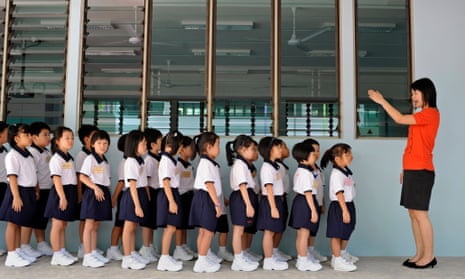We are on the brink of a crisis in teacher numbers. Apparently it’s harder to recruit when the country comes out of recession, since the profession loses its risk-takers. It doesn’t help one bit when the population insists on continuing to produce more children.
Yet those explanations are flimsy: the recession line is rather speculative, and relies on a conception of teaching as a cosy, stable, low-risk job for losers. This is a relatively recent caricature of the job, which was once more accurately understood as something people did if they cared about the future, other people’s children and the life of the mind.
The baby boom is real, yet doesn’t explain why recruitment continues to fall – according to new figures, numbers starting training courses are 14% down on 2010 – and turnover continues to rise. There are far more obvious reasons for people to leave this profession or shun it in the first place – the work is too hard and the treatment is too unpleasant.
It feels passe to listen to teachers’ unions these days: the Department for Education wrote them off as dinosaurs, “the blob”. Yet the unions have an inconvenient habit of making predictions that come to pass and delivering findings that are observable in the real world. In 2014, a survey by the National Union of Teachers found that 96.5% of teachers said the hours damaged their family life, and 90% had considered leaving in the previous two years.
The teachers didn’t see this as the unfortunate but necessary consequence of ambitious, muscular, take-no-prisoners education reforms: but rather, as the needless and iatrogenic effect of political meddling, in which amateurs with very little pedagogic experience blundered in with more and more targets, more and more stringently measured. Get a teacher on the subject of double-marking, and you will hear a near-perfect description of a job whose purpose has been completely subsumed by the bureaucratic structures made necessary by the assumption that everyone doing it is incompetent or lazy.
When results are good, that is billed as “parent power”; when they’re bad, that’s because the school is “coasting”. When a teacher is experienced and/or opinionated, the technical DfE term for that is “burnt out”. When the targets aren’t met, that is definitely the fault of the school, and can in no way be put down to the fact the objective changed and the children didn’t. An unrealistic goal is never named as such; rather, it’s a “challenge”, or it’s “modern”, or it’s the way they do it in Singapore.
“Good” doesn’t mean good, it means, “why aren’t you outstanding?”. There is no tolerance for the average and a constant striving for everyone to be above average – signalling, above all, a misunderstanding of what “average” means. Parents are encouraged to think of their relationship to teachers as adversarial, with the sharp-elbowed monitoring results for signs of slippage; which signs are, of course, nothing to do with home life and only to do with the school. All of this is well-known, and I only recap it out of solidarity with teachers, who must sometimes read the coverage of their profession, the casual denigration of their skills, the way they are weighed and measured like meat and their motives and dedication constantly questioned, and think the world has gone mad.
What would a nourishing system look like, beyond the obvious shift that it would start from an assumption of trust in and respect for the people working in it? Ofsted inspections, besides being often statistically nonsensical (it would take 60 hours of observation to get a reliable reading on the quality of a teacher) have, in the process of observation and quantification, laid waste to the far more valuable process of knowledge sharing that is at the root of innovation in education and beyond.
Teachers who remember the pre-Ofsted days talk of more experienced staff from within the local authority coming to observe lessons – not to judge them, but to show them what they would do. A genuinely porous process in which both teachers would learn from one another, the children were tacitly understood to be part of it rather than “service users” and the local authority operated not as the enforcer of standards – competent or otherwise – but as the broker of networks that improved understanding for everyone.
Teachers remain extremely good at building networks, even while all their incentives (even their pay in some cases is now related to results) are towards competing with colleagues and neighbouring schools, rather than collaborating with them. The success of the London Challenge, which transformed the performance of the capital’s schools after its launch in 2003, was not a story about super-heads and troubleshooting and measurement, but one of skill-sharing and cooperation in the primary and secondary sector.
Community schools continue to form mutually supportive clusters. They do this not because they’re dinosaurs, or inherently left-wing, but because some people – especially the ones who think deeply and critically, who may be over-represented in this profession – understand instinctively that networks of trusting experts, working together towards the same goals, drive up standards.
This has been noted repeatedly in the private sector; it was Silicon Valley’s porousness, the cooperation between Xerox and Apple, the sharing of information and standardisation of connectivity, which drove excellence. The contrast is Boston’s Route 128, which until the 80s was the other technology cluster: it was dominated by large corporations who jealously held on to staff, privileged loyalty over cross-pollination, put competition at the centre of their strategy and thereby consigned themselves to the stasis that was their undoing. By the end of the 80s the Massachusetts Miracle was over.
Self-sufficiency is so often considered a precondition for competition, and competition itself held up as the driver of useful human endeavour; but in fact, this autarky drives nothing but the needless protection of one’s own advantage, whether that’s in the raw material of a skilled workforce, or the intellectual property of a graphical user interface; all these things will catch on faster, and become more useful to more people, if they are allowed to circulate.
The analogy with schools is pretty clear: teachers, like any other bold professional innovators, will work best if they’re allowed to work together. League tables, Ofsteds, all the artificial ways in which schools are pitted against each other, militate against this cooperation.
Teachers mostly understand the grades for what they are, essentially measures of pupil affluence, unrelated to teaching quality; and yet they are still ground down by the relentless quantification. Teachers and parents would work much better in tandem, given that their ends are identical. The assumption of teaching as a network, rather than a bear pit of competing institutions, would obviate much of the measuring and marking that consumes a lot of their time and introduces so much tedium into what recently was a rewarding career. It wouldn’t just be better for the teachers themselves, it would be better for everyone.

